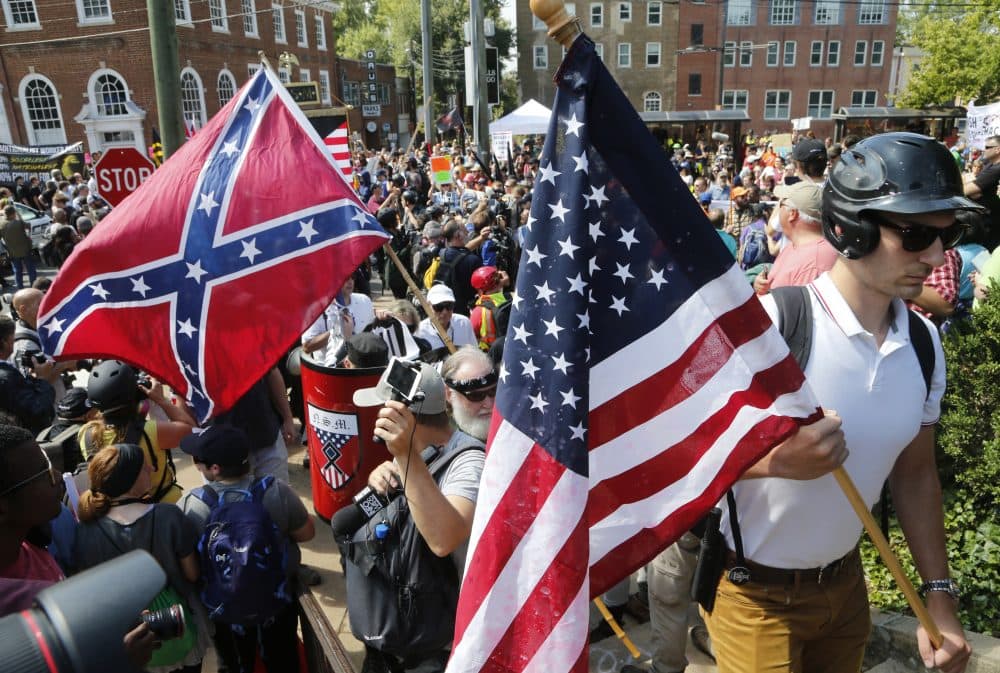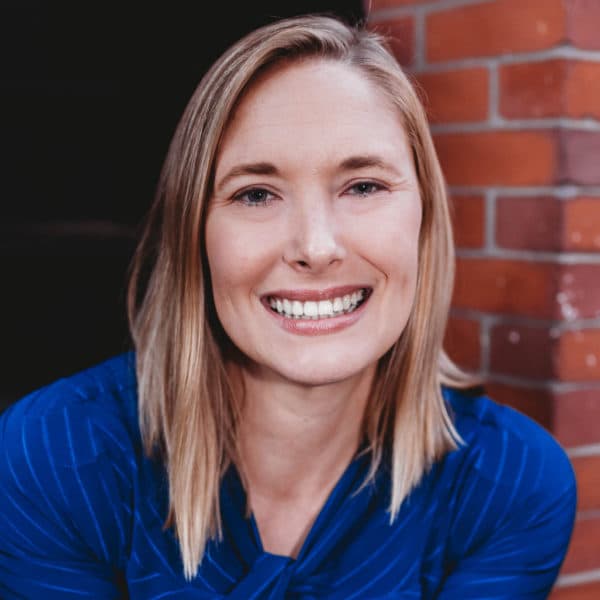Advertisement
Charlottesville, President Trump And Confederate History
Resume
This week on Freak Out And Carry On, Ron Suskind and Heather Cox Richardson respond to the violence in Charlottesville and President Trump's response. They also dive into the history of confederate statues with Randall Kennedy, law professor at Harvard University and author of "The Persistence of the Color Line: Racial Politics and the Obama Presidency", and Tony Horwitz, author of "Confederates in the Attic: Dispatches from the Unfinished Civil War".
Excerpts
Heather Cox Richardson: This is the moment that has been coming since at least Brown v. Board of Education, for the last 70 years 80 years. This is the moment when two generations, three generations of Americans, are forced to choose what they stand for. Do we stand for American principles of justice and equality before the law and equality of opportunity? Or do we stand for what Nazis stand for? While I was as aghast by Charlottesville and even more so, in a way, by the president's press conference that followed it, where the deep rage in our leader was ripped free for everybody to see. I stood watching both of those things, I didn't ever ever sit watching them, I stood the whole way through them. What struck me was that I was so impressed as I always am by Americans standing up and saying no. When the KKK marched through Washington D.C. in the 1920s, people weren't standing up against them, they were standing up for them. This time around people were standing up and saying, no, this is not what we stand for. I want to say that name again: Heather Heyer died for those principles. That's a name I think we are all going to be remembering. I actually feel better about America right now than I have in decades because we see it and we are saying no. We're no longer looking the other way and pretending that this side of America isn't there.
Randall Kennedy: We are in an horrific moment. The violence, the lethal violence, was of course terrible. The response by the president of the United States was just absolutely egregious. It was terrible, it was disheartening. I do think that the point that was just made, that we ought not overlook the people who are resisting, the people who are out in the street, the people who say, no, let's love one another not hate one another. I think it's a mistake if we empower the Nazis and the Klansmen by exaggerating their influence. Having said that, at this particular moment, we are led by a president of the United States who ran a campaign that was you know animated by bigotry to tell you the truth. I mean there's just no other way to put it. We ought not be surprised about the conduct of the president of the United States and we ought to be horrified by it. The fact of the matter is Nazis have been part of American life, the Klan has been part of American life, racism has been part of American life for decades and decades and decades. What is different though is a president of the United States who was showing some degree of sympathy for it. That is new and that is absolutely disturbing.
Richardson: So Randy, you are a noted optimist on the direction of America, certainly on issues of race, and I wonder how you feel now?
Kennedy: My views have changed. I still count myself in the optimistic camp. I think that we shall overcome. I'm like Frederick Douglass, I think that people of various races will be able to share this country as neighbors and as equals. So I'm still an optimist, but I've had to re-calibrate things. I did not think that I would see on varnished, overt, unapologetic racism burst out like it has and obtain sympathy from the highest circles of the American government. It is making me revise some things I've written. I am in a more somber mood than I have been, frankly, ever.
Ron Suskind: You look at the Germans, since World War II--and this has been a part of my education as a Jew. I was raised, my dad wouldn't buy a Mercedes--but I've known many Germans at this point, from Germany, and you look at how they did truth and reconciliation in that country across many decades and what that society now looks like. They said we're going to go right out the hardest truth, look at them with the cold eye and open ourselves to the pain and we will thereby evolve. And the question is: are we maybe crossing into that realm now in terms of some of these issues that have long bubbled under the surface?
Tony Horwitz: [Trump makes] the classic slippery slope argument, that you kick open this door to taking down monuments and attacking age old icons, and where does it end? I am not one to stick up for Washington and Jefferson. They were slave owners but that's not the only reason we remember them. Robert Lee would not be on the many monuments he is if he had not been leader of the Confederacy. Likewise the others who are honored. And you can't disassociate them from the lost cause, which was defense of slavery. So I you know, I think he makes a somewhat valid point. I mean if we are going to open that door we do have to question really the first 70, 80 years of U.S. history, when slavery was legal, when slaveholders occupied the White House, when the American flag flew over a nation in which slavery was legal. But I don't think it should be an excuse for not addressing the specific monuments.
Kennedy: Listen I think symbols can mean many different things. At [Harvard Law School] the controversy was over the shield which was the emblem of the law school. It was a shield that was bequeathed to the Harvard Law School by a slave owning and slave trading family, the Royal family. There was a big to do about it and it was repudiated finally. Now, one thing that's sort of interesting, a very distinguished historian, Annette Gordon-Reed, actually dissented. Annette Gordon-Reed said, "listen, I'd like to keep the emblem in order for us to remember the slaves." I could imagine somebody taking the following position: No, let's don't tear down the monuments, let's not engage in subtraction, let's engage in addition, Let's keep the monuments where they are. That's part of history. Let's bring in all these people who have been rendered invisible, women, racial minorities, others. In my view, we should have a thorough discussion. Frankly, yes, let's talk about George Washington. I'm not afraid of talking about the status of George Washington, Thomas Jefferson, Lincoln or whomever. Racism is a very deep part of American society and it has surfaced everywhere and we need to grapple with that. Where we ultimately come out is unclear. I'm sure that different people have different positions. Reasonable people can reach different conclusions. And the fact of the matter is with respect to Washington and Jefferson, yes there has been a re-calibration of their image and their status in American life in light of people taking seriously the fact that they were slave owners. And by the way at the very time that they were slave owners there were people who were abolitionists. There were people who recognized the humanity of black people. So let's not either fall into the notion of "Well that was long ago and everybody viewed black people as being below them."
Richardson: Wait, those men were flawed, as are all human beings, and they had a set of principles that established this nation. And yes, we have to grapple with that. If we start requiring them to be perfect we're going to have to take down every statue in America because there are almost no men who are on statues who believed in equal rights for women. So if we're going to start sanitizing things we're left with no heroes. But that is different than the Confederate monuments and they must be contextualized or gotten rid of because they tried to destroy this country.
Horwitz: After the Civil War, this mythology grew up in the south that attempted essentially to rewrite history and say that the Confederate cause was not about slavery, it was about defense of sovereignty against northern aggression and federal tyranny and that the war was lost but the cause was right and somehow blameless. I might take the Annette Gordon-Reed view though that it's worth preserving this history as a history of a horrible moment in America when these monuments went up, mostly in the late 19th and early 20th century, at the height of segregation and lynching and in the heart of Jim Crow America as bold statements of white supremacy. It's for every community to decide but I think there's an argument to be made that rather than tear these monuments down and sweep this history under the carpet that we need to remember it and reinterpret, contextualize, to explain the mindset that created these monuments on the question of history.
The views and opinions expressed in this podcast are solely those of the participants and do not in any way reflect the views of WBUR management or its employees.
